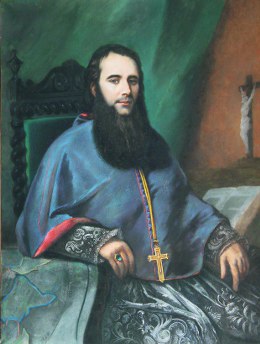Related Research Articles
The Apostolic Faith Church of Portland, Oregon, also known as the Apostolic Faith Mission of Portland, Oregon, is an international Holiness Pentecostal denomination of Christianity, with nationwide reach and headquartered in Portland, Oregon, United States. It was founded in 1907 by Florence L. Crawford, who was affiliated with William J. Seymour and the Azusa Street Revival of Los Angeles, California. By 1908 Crawford had independently founded what would become the Apostolic Faith Church. Since July 2000, the Superintendent General of the Apostolic Faith Church has been Darrel Lee.

The Apostolic Assemblies of Christ, Inc., Incorporated (AAofC), is a Christian Church in the Oneness Pentecostal tradition. The Church is episcopal in governance. The Apostolic Assemblies of Christ was founded as an ecclesiastical corporation under the statutes of the non-profit corporation laws of the United States. The purpose of the founding of the corporation was to provide an ecclesiastical body where all churches could feel free to worship God and where all churches would have representations on all levels. The founder and presiding bishop (emeritus) G. M. Boone started with 7 churches and currently there are 259 churches worldwide. From the beginning, the Apostolic Assemblies of Christ had a set goal and purpose to its very existence in order to exalt the name of Jesus Christ. The organization's headquarters is located in Detroit, Michigan.

The Catholic Church in South Africa is part of the worldwide Catholic Church composed of the Latin Church and 23 Eastern Catholic Churches, of which the South African church is under the spiritual leadership of the Southern African Catholic Bishops Conference and the Pope in Rome. It is made up of 26 dioceses and archdioceses plus an apostolic vicariate.
Zionist churches are a group of Christian denominations that derive from the Christian Catholic Apostolic Church, which was founded by John Alexander Dowie in Zion, Illinois, at the end of the 19th century. Missionaries from the church came to South Africa in 1904 and among their first recruits were Pieter Louis le Roux and Daniel Nkonyane of Wakkerstroom who continued to evangelize after the Zionist missionaries left in 1908.

The Catholic Church in Togo is part of the worldwide Catholic Church, under the spiritual leadership of the Pope in Rome.

The Apostolic Faith Mission of South Africa (AFM) is a classical Pentecostal Christian denomination in South Africa. With 1.2 million adherents, it is South Africa's largest Pentecostal church and the fifth largest religious grouping in South Africa representing 7.6 percent of the population. Dr. Isak Burger has led the AFM as president since 1996 when the white and black branches of the church were united. It is a member of the Apostolic Faith Mission International, a fellowship of 23 AFM national churches. It is also a member of the South African Council of Churches.

The Missionary Society of St. Columban, commonly known as the Columbans, is a missionary Catholic society of apostolic life of Pontifical Right founded in Ireland in 1917 and approved by the Vatican in 1918. Initially it was known as the Maynooth Mission to China. Members may be priests, seminarians or lay workers. Fr John Blowick, one of the two founders of the Society, also founded the Missionary Sisters of St. Columban to share in their work. The society is dedicated to St. Columbanus. The current international headquarters is in Hong Kong.

The Archdiocese of Kampala is the Metropolitan See for the Roman Catholic Ecclesiastical province of Kampala in Uganda.

Jesse Delano Ellis, II, commonly known as J. Delano Ellis, was an American Protestant religious leader and progenitor of unity among African American Pentecostals with Trinitarian and nontrinitarian affinities.

The Roman Catholic Archdiocese of Lagos {Lagosen(sis) in Latin} is the Metropolitan See for the Ecclesiastical province of Lagos in Nigeria.

The Society of African Missions, also known as the SMA Fathers, is a Catholic religious society of apostolic life of pontifical right for men founded by Melchior de Marion Brésillac in 1856. They serve the people of Africa and those of African descent.
Bernie L. Wade, born on June 29, 1963, in Lakewood, Ohio, is an American minister, entrepreneur, and author. He has served in a variety of roles, including senior pastor and chief operations officer of the Christian Brotherhood. He also served as president of CWN, and vice-president of Spread the Spirit of Love.
The African Israel Church Nineveh is one of the largest African Initiated Churches in Kenya. The Church was founded by David Zakayo Kivuli, who belonged to a small clan which though integrated into Bantu society was Nilotic in origin, being on the border of Luo and Luhya territory. He grew up being friends to all and speaking Nandi and Luo as well as his native Maragoli. The church has thus been able to draw membership from both Luo and Luhya. Today the AINC followers are found in every large town in Kenya. Though the majority are members from two tribes, the Luhya and the Luo, the church has spread among many other tribes in the country. It has small communities in the US and the UK.

Christianity is the largest religion practiced in Zimbabwe, accounted for more than 84% of the population. The arrival of Christianity dates back to the 16th century by Portuguese missionaries such as Fr. Gonsalo Da Silveira of the Roman Catholic Church. Christianity is embraced by the majority of the population. It is estimated 85 percent of Zimbabweans claim to be Christians, with approximately 62 percent regularly attending church services. Christian faith plays a very important role in the organization of Zimbabwean society.
Joseph Gotthardt was a Catholic missionary and later Bishop and Archbishop in South-West Africa. He was the first to set up missions in the Kavango Region and in Ovamboland, became the first Vicar Apostolic of Windhoek.
Archbishop Doyé Teido Agama is a Christian leader within the Pentecostal Holiness and Convergence movements. He is the founder of Apostolic Pastoral Congress, a collegiate collective of Pentecostal bishops and pastors adhering to paleo-orthodoxy and was for many years the organisation’s President and its presiding prelate. He leads the Christian Way of Life group of churches. He has been a prominent figure in the Churches Together in England movement and is involved extensively in the African diaspora and black and multicultural affairs.
Pentecostalism began spreading in South Africa after William J. Seymour, of the Azusa Street mission, sent missionaries to convert and organize missions. By the 1990s, approximately 10% of the population of South Africa was Pentecostal. The largest denominations were the Apostolic Faith Mission, Assemblies of God, and the Full Gospel Church of God. Another 30% of the population was made up of mostly black Zionist and Apostolic churches, which comprise a majority of South Africa's African Instituted Churches(AICs). In a 2006 survey, 1 in 10 urban South Africans said they were Pentecostal, and 2 in 10 said they were charismatic. In total, renewalists comprised one-fourth of the South African urban population. A third of all protestants surveyed said that they were Pentecostal or charismatic, and one-third of all South African AIC members said they were charismatic.
The doctrines and practices of modern Pentecostalism placed a high priority on international evangelization. The movement spread to Africa soon after the 1906 Azusa Street Revival in Los Angeles.
The Apostolic Church - Ghana is a denomination emanating from the Pentecostal movement which started from the 1904–1905 Welsh revival. It practices self-governing and claims to own local churches in every district in Ghana and foreign mission fields with its headquarters in Accra, Ghana. The church is firmly identified as a Pentecostal, Trinitarian, Evangelical and Bible-believing church.
References
- ↑ "Our church history". UAAC. Retrieved 18 August 2012.